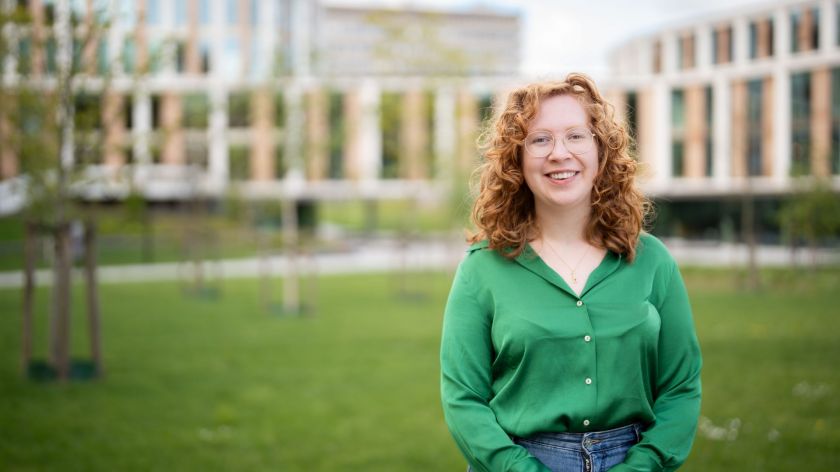Gwendolyn from Nijmegen will represent student voices in The Hague
-
 Foto: Johannes Fiebig
Foto: Johannes Fiebig
Five board years in four associations and at various levels of Radboud University: Gwendolyn Hermans seems to be one of the last of the Mohicans in the shrinking world of student administrators. ‘Thankfully, I really like meetings.’
As the Faculty of Social Sciences assessor, Gwendolyn Hermans (24) would often hear that the big decisions are made in The Hague. ‘That happened, for example, when we proposed that all first-year students should follow a mandatory workshop on social safety,’ says the 24-year-old psychology student. ‘To make that happen, you need to sit down with the minister.’
That piqued Hermans’ interest, so she applied for the board of the Dutch National Student Association (ISO). And she was successfull: the next academic year, she became responsible for the internal affairs of the association as its secretary. ‘The ISO represents students in the politics of The Hague,’ Hermans explains. ‘We have to make sure that we are really being listened to.’
Hermans has experience in abundance: at Radboud University, she was part of the board of four associations. ‘When I started studying Psychology in Nijmegen, I looked at the website of the study association SPiN. I thought it would be cool to be responsible for all the activities. I became secretary in my second year.’
Burnout
But Covid put an abrupt end to Hermans’ first board year, as student life shut down overnight. ‘That’s why I decided to do another board year,’ she says. ‘So I became treasurer of SOFv, the umbrella organisation of Nijmegen’s study associations.’
‘In three days, we organised a dinner for eighty students in De Waagh’
A new Covid flare-up also took a toll on Hermans’ second board year. The gala, planned to perfection, had to be cancelled a week in advance. ‘That was terrible,’ she says. ‘Instead, we organised a dinner for eighty students in De Waagh in three days. That was exciting. Later, I also set up a barbecue for 200 people.’
However, the Covid crisis also left its mark on Hermans; she developed symptoms of depression and ended up with burnout. To help her get out of this, she decides to start work as a study association board member again. This time as commissioner of formal affairs and vice chair of N.K.S.W. Kompanio, the umbrella association of Social Sciences. ‘There, us students could raise issues like internationalisation with administrators.’

At this point, Hermans had gotten a taste of it: a year later she started as assessor of the Faculty of Social Sciences. In this capacity, she mainly concerned herself with student communications. She also had plenty of meetings – about twenty to thirty hours a week. ‘Thankfully, I really like meetings,’ she says. ‘Especially, if you’re asked for your opinion, and then your input is listened to.’ That same year, Hermans, as chair of the board, kept the dissolution of student party asap on track.
Push for board years
The dissolution of asap in 2022 is a sign of things to come: student parties and student associations have been struggling to recruit enough board members for years. Moreover, most students don’t seem to care about the participational bodies: turnout for last year’s student elections reached an all-time low at 14 percent. ‘That is embarrassingly low, but we are not the only university struggling with this,’ says Hermans. ‘This is partly explained by Covid, which made students less engaged with the university.’
According to Hermans, a part of the solution lies in higher pay for members of the participational bodies. ‘Right now, a lot of students can’t afford to join the USR, because the amount of work would mean they won’t have time for another student job.’
She’s already talked various friends into a board year. The arguments she uses? ‘You learn a lot during a year like that, like organising activities, setting priorities, and being able to separate main- and minor issues. Because of my ADHD, the first years of my studies weren’t the easiest, but by being on boards I learned to handle deadlines and eventually became a better student. I’ve almost finished my bachelor’s in the meantime.
‘The pressure to graduate nominally -because you have to pay off a fortune otherwise- is off’
With the return of the basic student grant, Hermans is slowly noticing a turnaround in active student life. ‘Now that studying has finally become a little less expensive, students find it a bit less of a problem to study a year extra and be a student board member.’
According to Hermans, the return of the basic student grant is also a good thing for student welfare: ‘The pressure to graduate nominally -because you have to pay off a fortune otherwise- is off; I expect that fewer students will end up with a burnout or depression. People feel more freedom to get through university at their own pace.’
On the Executive Board
For her efforts as a student administrator, Hermans received the student award last September, at the Opening of the Academic Year. The psychology student fondly recalls the ceremony on stage in De Vereeniging, with her parents sitting proudly in the audience. ‘It was a nice recognition for everything I have done for other students.’
Hermans sees her work as a secretary at the ISO, in a small office in Utrecht, as a gap year. After that, she might apply for the premaster and master of business administration.
Administration, Hermans says, is something she wants to do for the rest of her life either way. ‘Even if it’s just at my children’s sports club.’ In the short term, she hopes for a job as a policy officer at the Ministry of Education, Culture, and Science. But her biggest dream is to eventually end up on a college or university board herself. ‘Preferably on that of Radboud University’s, of course, because this is where my roots are.’
Translated by Stella Kuipers



